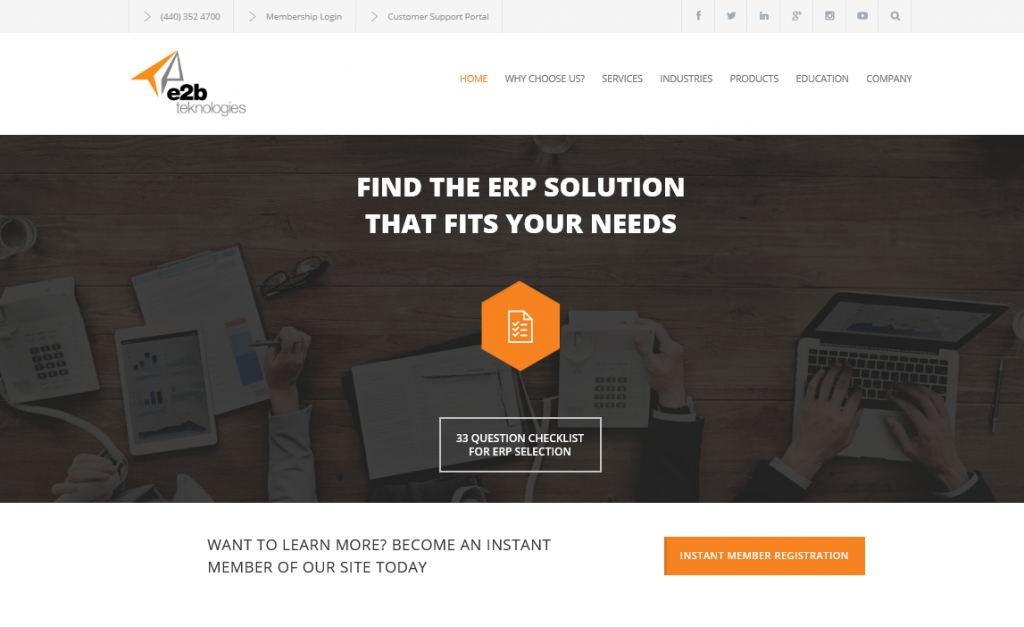What’s the best website platform for small businesses? It will depend on exactly what you want to do with it. If you want a simple place for customers and prospects to go to contact you then almost any platform will do and you might even get by with just a Facebook or Google Sites page. If you want to sell online then you probably want to look at ecommerce platforms that may have everything you need in a single solution.
For a more traditional website, WordPress is by far the most popular. In fact, it’s estimated that WordPress powers one in every seven websites online! What? Wait a minute! Really? Why?
In full transparency, we love WordPress and this site is built on WordPress. But that wasn’t always the case. About a decade ago we developed our own website using Adobe software and different technologies. The upside was that we were in complete control over the site. The downside was that we didn’t have an easy way to manage the content (content management system) and every few years the site started to look pretty old as technology and design changes frequently. What’s sharp and desirable today will certainly be boring and outdated in a short period of time.
We switched to WordPress not because it’s the most popular (that’s only part of the reason). We switched to WordPress because it’s simply an awesome platform. One word of caution on this – there are two version or flavors of WordPress – WordPress.com and WordPress.org and they’re different enough that you need to know which is best for you.
The main difference between the two is who hosts the site. With WordPress.com, your site is hosted by WordPress. The downside is that WordPress (not necessarily your site) gets a lot of search engine optimization credit from Google for the content you post on it. You’re also limited to the plug-ins you can install and some of the features to manage various aspects of your site. The upside is that it’s self-contained, backed-up, and there’s no fussing around with hosting or installation. As such, WordPress.com is a great option for smaller sites like personal blogs.
WordPress.org is a website platform which is typically downloaded and installed on a server that either you host yourself or through one of many third-party WordPress hosting companies (there are a ton of them so do your homework to pick the right one). This is the way we work with WordPress for this website and for our sister sites at www.anytimecollect.com, www.e2bcal.com, and www.calibration.aero.
The advantage to WordPress.org is that your domain gets full search engine optimization credit for the content you host. You also have access to a world of tens of thousands of plug-ins and you have a lot more control over all elements of the site. And this is crucial. As of the time of this writing there were over 53,000 plug-ins on the WordPress plugins site! Granted, the majority of them are only used by a handful of people but some are absolutely amazing and if you think hard about your site you can find some unique ways to utilize them.
For example, we used to develop separate landing pages to gate content on our sites so that visitors (like you) had to fill out a form to get certain things of value like white papers, access to detailed videos, etc. The problem with this method is that you must fill out a form each time you want a new piece of content. So, we fixed this problem by using a membership plug-in (Simple Membership) to organize content on our site into three categories – free (you’re reading this and it’s free), Instant Membership (also free but you must create a login in to our site and at a minimum give us a little info about yourself like your email), and Premium (also free but you must be approved for membership – this is the keys to the castle and the best content we offer). This strategy allows our customers and prospects to get a lot more information without having to continually fill out request forms. It also helps us because we can keep competitors out of our secret sauce (Premium content).
We use a few other great plug-ins for WordPress including Chronosly for event calendars, Google Analytics by MonsterInsights, Menu Swapper (allows us to change menus by page since we manage multiple sites and sub-sites from a single instance of WordPress), QL Sidebars (for special sidebar promotions – mainly Instant and Premium Membership), WordPress to Sugar (lead form plugin for Sugar CRM which we use for lead capture), WPBakery Visual Composer (for more advanced and visual site design), and Yoast SEO. There are a few others we use but these are the main ones.
Here’s the great thing about WordPress.org – you can do just about anything with it and it’s super easy to build out new pages, new menus, and updated or create new content. But if you’re not technical and you don’t have any special needs for your website then you might consider some of the other options available such as Wix.com, Google Sites, Weebly, Squarespace, Virb, Voog, and others. A nice directory of some of the top website platforms is available on sitebuilderreport.com.
Our in-house webmaster used to hate WordPress but now she loves it. Themes and templates make it easier to manage the site with a defined framework and overall look and feel. Plugins solve problems quickly without a ton of development. And she and her team aren’t directly responsible for posting every piece of content or maintaining the site. This has been easily off-loaded to everyone in our marketing department.
We know that websites can be a terrifying experience for some businesses. Contact us and we’d be happy to show you how we use WordPress and to discuss how we can integrate your website with your accounting or ERP systems, ecommerce websites, and other business applications.



